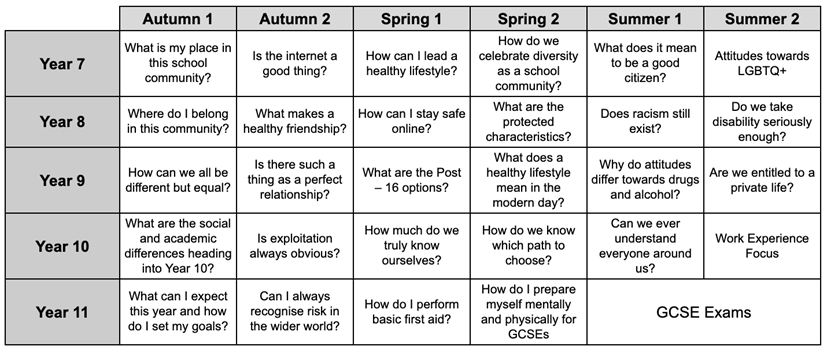PSCHE
Curriculum Purpose
Preparing students for life after school
Our PSHCE curriculum will prepare students for life beyond school. This will be through a focus on careers and preparing them for the practicalities of life after school as well as preparing students to be able to engage articulately in discussion on a wide range of issues.
PSHCE is responsive to the needs of the year group
Our PSHCE curriculum will meet statutory requirements whilst being responsive to the pastoral and safeguarding needs of each phase. Phase Leaders are members of the safeguarding team which allows the curriculum to be responsive, iterative and proactive in terms of national themes.
The needs of our community
Our curriculum and lessons will support the community of students within our school and actively challenge inequalities through discussion of the protected characteristics. Each year group will consider at least one protected characteristic per year. This will be supported through Drop Down Days and wider events such as anti-bullying week and Black History Month.
Teaching PSHCE for its intrinsic value
We believe that pastoral learning is as important as academic learning. We believe that the pastoral curriculum equips young people to be citizens with a burning passion to serve their communities.
Curriculum Rationale
What do we teach and why do we teach it?
The selection of topics for PSHCE spans both statutory content and topics that are relevant to our community. As members of our safeguarding team oversee the curriculum, it reflects the issues that our students face during their school experience. We return to essential themes such as the protected characteristics, health, relationships and online safety throughout the curriculum. We deliver topics through teacher led sessions, a range of discussion based activities and considering real-life scenarios. We also have Drop Down Days that enable students to discuss and explore topics in more depth.
Why do we teach it in that order?
Students are introduced to topics across Phase One (Years 7 and 8) that they then return to in more depth in Phase Two (Years 9 and 10) and Phase Three (Year 11). For example, students are introduced to the idea of protected characteristics which they then return to across the curriculum. Topics such as consent and relationships are also introduced in an age appropriate manner in Phase One which are considered in more depth as students mature. We follow advice on age appropriate content from organisations such as The PSHCE Association and Split Banana. We respond to safeguarding logs to ensure we are tackling themes that are relevant to each year group.
Curriculum Overview

